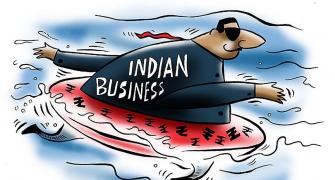Globally, the music industry is known for its immense capacity to whine. Historically, it has opposed every new technology. From the gramophone to the CD and now the internet and iPod, every decade has seen a wave of protests and lawsuits over every new storage or distribution format.
Funnily enough, this makes it one of the best industries to watch when it comes to figuring out what the internet could possibly mean for the entertainment business.
Unlike films, music is a low bandwidth product. That means it is easy to digitise, compress and send over the narrowest, worst possible internet connection. Therefore, it has always been the first entertainment product to get hit by any new technology. Just like it got hit by the internet in the early nineties. The American music industry reacted in a typical fashion by lobbying hard for a Digital Millenium Copyright Act (1998) when it should have been furiously looking at ways of making money from the net.
Even as the industry shrunk year-on-year, it sued users and treated them as criminals instead of addressing the basic issue of how to serve its product better.
I have no soft feelings for piracy. It is wrong and a thousand arguments cannot make it right. But the music industry's exclusive focus on piracy and its intractability when it comes to revenue-sharing has meant that even as it was gaining from digitised music, it was alienating everyone from consumers, to potential partners.
Some of the major internet portals have publicly expressed frustration in their dealings with the music industry.
Yet with all the whining and moaning two clear trends, of interest to the rest of the entertainment business, have emerged.
The first most obvious one is the growth of digital music. According to figures provided by Soundbuzz, a digital music aggregator that was recently acquired by Motorola, the global music business clocked $40 billion in revenues in 2007. Of this, about 35 per cent came from non-physical sales. In several markets across the world, especially in Asia, the switchover to digital is almost complete.
India followed the first trend closely. In 2007, the Indian music industry grew to Rs 2,747 crore (Rs 27.47 billion), a growth of 54 per cent over 2006. The important thing is that more than 70 per cent of this came from selling music in new formats or non-physical sales. These could be downloads, ringtones or caller tunes.
The second trend is a more interesting one.
Markets where digital music has caught on are also the markets where consumers are willing to pay higher prices to watch live music. According to one estimate, live music will become a bigger industry than recorded music in the UK by 2010.
An academic paper in the US successfully correlates the growth of file-sharing technologies to the rise in demand for live music even as concert ticket prices rose. Music companies too have started tying in popular artistes' live performance revenues to their contracts, something they did not do earlier.
This is ironical. In the 1940s, live musicians went on a protest because they were worried that vinyl records would ruin the live concert business which was then the largest source of revenue for the industry. They were right. The share of the live concert business went down and that of recorded music rose.
Now, it would seem (because the numbers are still not in), that one of the best emerging revenue streams for recording companies is live music. Life has come full circle.
In India, however, this revenue stream is difficult to tap because of issues of infrastructure that the events business faces. The biggest is the lack of concert venues.
However, what is of interest is the lessons the music industry holds for other entertainment businesses -- that of speed and greed. Move fast if you want to retain your businesses as distribution technologies evolve. And be a little more generous on partnering and revenue sharing. Are telecom companies listening?
The author is a media consultant and can be contacted at vanitakohli@hotmail.com.








